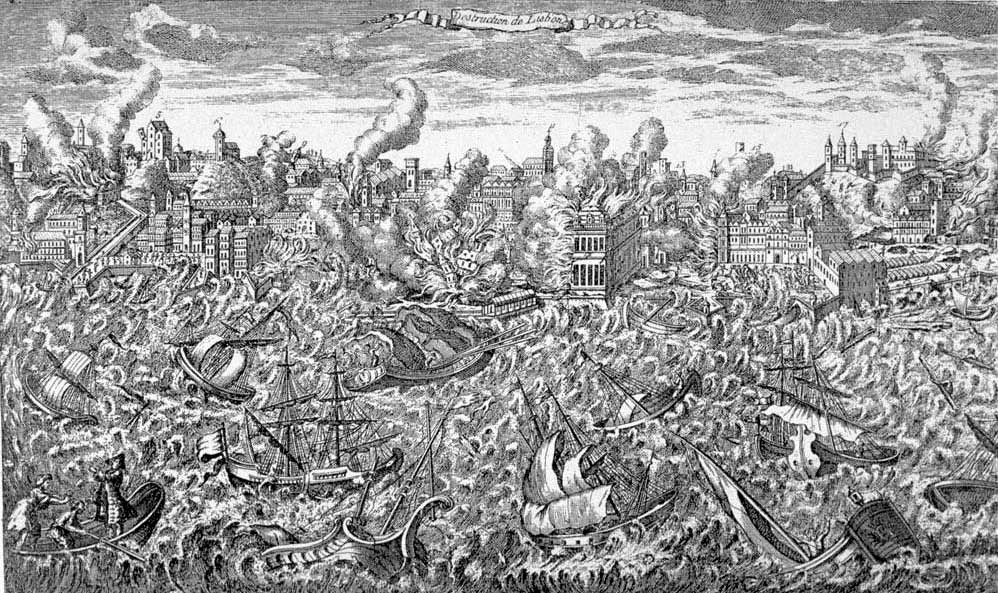Llewellyn King: When the turmoil subsides, Americans will be living much differently
1755 copper engraving depicting Lisbon in ruins and in flames after the 1755 earthquake, which killed an estimated 60,000 people. A tsunami overwhelms the ships in the harbor.
WEST WARWICK, R.I.
I have only been in one big earthquake. It was years ago in Izmir, Turkey. As I was standing in the garden of my hotel, the ground underfoot was sloshing around like water in a waterbed.
Now I feel as though the world is experiencing a prolonged earthquake. Life, metaphorically, is shifting around us and has been since COVID-19 appeared on a pandemic scale in early 2020.
The pandemic, a major war in Europe, and the resulting shortages and inflation, are the most measurable disturbances, but others are also contributing to the shaking. They may be dismissed as aftershocks of the pandemic and Russia’s war in Ukraine, but they amount to quakes in their own right.
The very way we live is changing or being changed.
Consider these things that won’t go away, even after inflation has settled down after there is a resolution to the Ukraine war, and after supply chains are reinvigorated:
· The way we work has changed forever. There will be more remote work, virtual offices and empty office buildings.
· The same pressure to virtualize will extend to the factory floor wherever possible.
· How we shop has changed and will continue to do so. There will be more online shopping, fewer brick-and-mortar stores and many malls converted to other uses. The days are numbered for the great emporiums of yesterday.
· The way we receive medical care has changed: More than half of our physician visits will be virtual.
· Where we live is up for grabs. Virtual workers don’t need to live close to where they work. Summer homes are becoming year-round dwellings.
· What we drive will be different. If your next car isn’t electric, then the one after that will be. The same goes for practically everything that moves, from lawnmowers to buses and trucks.
· A sartorial meltdown has already begun. Fitted women’s suits and dresses are out, flowing is in. Men have abandoned neckties, and suits are on the endangered list. New reality: If it can’t go in the washing machine, it won’t go in the closet. No more dress to impress.
· Our diets are under pressure from inflation and supply-chain problems. Expect to see more “bowls.” They are both convenient and enable the use of inexpensive ingredients. Plant-based food is the new beef. Also cheaper, farm-raised fish – tilapia and catfish – will be the new halibut and grouper.
The knock-on effects of some of these changes will affect education. Already, it is partially remote and bound to the Internet, but will become more so as people move from company-location work to work from-a-nice place. If Dad and Mom are practicing law in Washington, D.C., from Maryland’s Eastern Shore, the Eastern Shore schools will have to expand and be upgraded. This will be repeated across the country.
Even our love lives will be transformed. The new realities are already closing off an old source of love mates: the office. Those voluntarily stranded at home must find new ways of meeting people if they are mate-hunting – presumably a boon to singles bars and computer dating.
We will have new special classifications. There will be the destination workers, like those who man the post office and repair things, and those who work virtually. What will they be called? Perhaps the “destinationals” and the “virtuals.”
Finally, there is the changing force of the weather. It is worth considering whether as many people want to move from the Snowbelt to the Sunbelt as they have for decades. Many of the sunny destinations, such as Florida, Arizona and Texas, have had day-after-day temperatures over 100 degrees F this month. Is that what the North-to-South migrants desired?
The 2020s are turning out to be a transformational decade, profoundly so. When the shaking stops, things will be different, life will be changed.
Llewellyn King is executive producer and host of White House Chronicle, on PBS. His email is llewellynking1@gmail.com and he’s based in Rhode Island and Washington, D.C.

